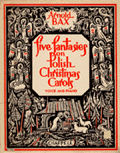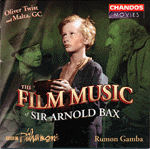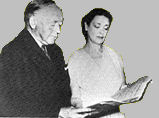Copyright
1940-41
Nothing composed.1942
- Malta, G. C.
- 347. Music for a flag-waving documentary by the Crown Film Unit. "I do not feel that air-raids have much to do with my own particular style" (A.B.). He subsequently recycled part of it for the Victory March of 1945 and the Coronation March of 1952.
- Five Greek Folksongs
-
348. Unaccompanied chorus (SATB).
(1) Miracle of St Basil
(2) The Bridesmaid's Song
(3) In Far-off Malta
(4) The Happy Tramp
(5) A Pilgrim's Chant
Commissioned by their translator, Michel-Dmitri Calvocoressi. "They are very quaint and rather barbaric tunes but
Polish carols:sheet music I think I made something interesting of them"(A.B.) - Five Fantasies on Polish Christmas Carols
-
349. Unison trebles and string orchestra.
(1) God is born
(2) In Nightly Stillness
(3) In the Manger he is lying
(4) Lullay, dear Jesus
(5) Merrily to Bethlehem
Commissioned by the translator, Jan Sliwinski, for the benefit of the Polish Children and the Polish Red Cross. - Two Fanfares
- 351. For brass, organ and percussion, commissioned (by the Ministry of Information) to commemorate the 25th anniversary of the founding of the Red Army.
1943
- Legend-Sonata
- 352. Suddenly, in the middle of the Second World War, Bax's muse wakes up again. Of this three-movement sonata for cello and piano, dedicated to Florence Hooton, Bax wrote "I enjoyed writing it and perhaps because of my long rest from responsible composition it all came very easily" (A.B.) It is indeed one of the best of his post-symphonic works.
- Salute to Sydney
- 353. Fanfare for brass and percussion, commissioned by Arthur Bliss for a BBC Overseas broadcast celebrating Australia's contribution to the defence of the Commonwealth.
- Work in Progress
- 354. Orchestral overture, strangely titled (perhaps reflecting the then popular BBC radio programme "Music while you work?") for a short piece commissioned by ENSA (National Services Entertainment Association). The composer described it as a jeu d'esprit, and it includes a brief reference to Deutschland über Alles. But if you can put this out of your mind, the central section sounds more like a reversion to Irish legendary tone-poem-land. "For reasons of national security during wartime, the precise location of the première was not mentioned in the press" (G.P.)
- Dream Child
- 355. (c.1943) For voice and piano; text: Val Newton.
1944
- To Russia
- 356. Baritone solo, chorus (SATB) and orchestra. Text: John Masefield, Ode to the Red Army. "The Albert Hall Anglo-Russian Jamboree yesterday was incredibly boring and I returned here [to Storrington] dead to the world". (A.B.)
- A Legend
- 357. Bax's last tone poem, one of many of his "Legends", was written for a Promenade Concert. Very enjoyable, in a grim/Grimm sort of way, albeit hardly ground-breaking.
- Te Deum
- 359. For chorus (SATB) and organ. Text: St Ambrose (attrib.). One of several BBC commissions for new church works by English composers.
- Nunc Dimittis
- 360. For chorus (SATB) and organ. Text: Luke's Gospel. BBC commission (as above).
1945
- Violin Sonata No. 1
- 361. Fourth and final version. "It was one of my earliest tunes to be published, and lordy what a host of errors and ambiguities I let pass" (A.B.) See also 1910 (GP124), 1915 (GP166), 1920 (GP236).
- Suite on the Name Gabriel Fauré
- 362. Piano solo, comprising Prelude, Barcarolle, Polka, Intermezzo (Storm), Finale (Quodlibet). Later rearranged for harp and string orchestra (GP379, 1949).
- Gloria
- 363. Communion service for chorus (SATB) and organ. Text: the Lesser Doxology (Gloria Patri).
- Victory March
- 364. Circumstances of composition unknown, but evidently done to commission. Dated 8 September, it may reference VE Day, which was exactly four months earlier, or perhaps VJ Day on 15 August. as it is quite short and incorporates a theme already used in the film music for Malta G.C. and to come to his rescue again for a requisite Coronation March in 1952.
- O Dame get up and Bake your Pies
- 365. "Variations on a North Country Christmas Carol", for piano, commissioned by Julian Herbage, dedicated to him and his wife, and played by Harriet Cohen on BBC Radio 23.12.1945. Anna Herbage provided the pies, which were eaten after the performance (presumably off-air).
- Golden Eagle
- 366. Incidental piano-and-orchestra music for Clifford Bax's stage play about Mary, Queen of Scots, which ran for all of three performances before being mercifully beheaded.
1946
- Trio in B♭
- 367. For piano, violin and cello, written to commission (reluctantly) for a series of concerts at the Wigmore Hall. Bax described its first two movements as "severely classical… as to the last [mostly in 5/8 time] it might have a quotation from Hamlet: 'This is miching mallecho - it means mischief'".
- The Bard of the Dimbovitza
- 368. Revision for mezzo-soprano and orchestra of GP160 (1914).
- Morning Song (Maytime in Sussex)
- 369. A slight but tuneful trinket for piano and orchestra dedicated to the (then) Princess Elizabeth on the occasion of her 21st birthday.
1947
- Four Pieces for piano
- 370. Namely: Fantastic March, Romanza, Idyll, Phantasie.
- St. George
- 371. For baritone solo, chorus (SATB), organ and orchestra. Text: John Masefield, subsequently published as A Play of St George. Commissioned to celebrate the sexcentenary of the Order of the Garter and the College of St George in 1348. Incomplete, and unperformed owing to lack of funds.
- Epithalamium
- 372. For chorus (SATB in unison) and organ. Text: Edmund Spenser, Epithalamion (a nuptial song). Composed in anticipation of the royal wedding (of Elizabeth and Philip), but, in the event, not used.
- Royal Wedding Fanfares
- 373. Three brass and percussion fanfares for the wedding of Elizabeth Windsor and Philip Mountbatten. "Dreadful" (A.B.)
1948
- Oliver Twist
-
374. Incidental music for

Bax film music on CD David Lean's film of Dickens's classic, with Alec Guinness as Fagin. This excellent example of the composer's art, best appreciated on screen but equally enjoyable in concert, makes one regret that he wrote nothing else for the filmic medium - despite the fact that "It is the book of Dickens that I most dislike, and there is no music in the subject at all" (A.B.). In 2002 the Bax Trust commissioned Graham Parlett to compile a complete score from a variety of sources (including the film soundtrack, remnants of the original manuscript, concert extracts made by Muir Mathieson and (separately) Stanford Robinson, and some copyist's parts found abandoned in a skip in Brighton); the final result was recorded and issued by Chandos on CD in 2003. "Mr Brownlow's theme" comes from In Memoriam of 1916. - Two Lyrical Pieces for piano
- 375. Transcriptions from the film music for Oliver Twist, namely "Oliver's Sleepless Night" and "Oliver and Mr Brownlow."
- Magnificat
- 376. For chorus (SATB) and organ. Text: Luke's Gospel. Rearrangement of an earlier Magnificat for voice and piano (1908) made for and dedicated to Harold Darke, organist of St Michael's, Cornhill, who turned out not to like it.
1949
- Concertante for Three Solo Instruments and Orchestra
- 377. Commissioned by the Henry Wood Concert Society, the concertante for cor anglais, clarinet, horn and orchestra is another of Bax's few late masterpieces. The composer referred to it as a kind of triple concerto in four movements giving prominence to, respectively, cor anglais, clarinet, horn, and finally all three used as soloists together.
- Concertante for Orchestra with Piano (Left Hand)
-
378. "This work was written for Harriet Cohen

Arnold and Harriet at
Concertante rehearsal after she had 'fallen carrying a tray of glass dishes into the kitchen of her London home in 1948 and cut the wrist of her right hand damaging the nerve and causing it to wither'". (Nicolas Slonimsky, Music Since 1900. Inverted commas his. It has been darkly pointed out that the incident followed Bax's declining to wed Harriet after she learned that his wife had died the previous year.) Of the consequent music Bax wrote "I find it terribly difficult to think of anything effective for the one hand. But then I am very much out of practice with writing anything for the piano at all." It is in the usual three movements, with a vigorous first movement and nice tune in the second, but the third falters somewhat and sounds relieved to reach an end. - Variations on the name Gabriel Fauré
- 379. A reworking for harp and string orchestra of the light-hearted piano piece (GP362, 1945) in five movements: Prelude, Barcarolle, Polka, Intermezzo (Storm), Finale (Quodlibet).
1950
Nothing composed.1951
- Two Fanfares for "Show Business 1851-1951"
- 380. Brass and percussion, for a radio programme associated with the Festival of Britain.
- Journey into History
- 381. Appropriately trivial background music for a 10½-minute British Transport documentary film about London. "It doesn't much matter what one writes for these entertainments", wrote Bax, but someone connected with the making of the film says that the composer showed great interest in the project, despite his later dismissive remarks.
1952
- Coronation March
- 385. Of what proved to be his last orchestral work, Bax wrote "I am now engaged upon trying to write a Coronation March (funny without being vulgar!) for the Abbey service. I think the result will be that my reputation will be killed for all time. However I am old now and it does not matter". ("Funny without being vulgar" is the title of a music-hall song with words by Harry Brett and music by Charles Ingle (1891). It is also a comment (possibly apocryphal) attributed to W. S. Gilbert about a performance of Hamlet by Herbert Beerbohm Tree (1892).) It incorporates yet again a tune originally devised for Malta G.C. in 1942 and recycled as a Victory March in 1945. In the event, the result compares favourably with others of its type. An obituary of the BBC broadcaster Peter Dimmock in The Guardian newspaper of 23/11/15 records the following fact: "Dimmock also prevailed on the Earl Marshal to ditch a specially-composed march to which the newly-crowned Queen and her entourage were to have processed out of the Abbey. Instead Dimmock suggested Elgar's Pomp and Circumstance March No 1, better known as Land of Hope and Glory." (Bax's march was played after the Elgar but the television broadcast had ended by then.)
1953
- What is it like to be Young and Fair?
- 386. Part-song for unaccompanied chorus (SSAAT). Text: Clifford Bax. One of several contributions by English composers to A Garland for the Queen, commissioned by John Denison, Music Director of the Arts Council. Ironically, in view of its title, and of the title of Bax's autobiographical fragment Farewell my Youth, this was his last completed composition.